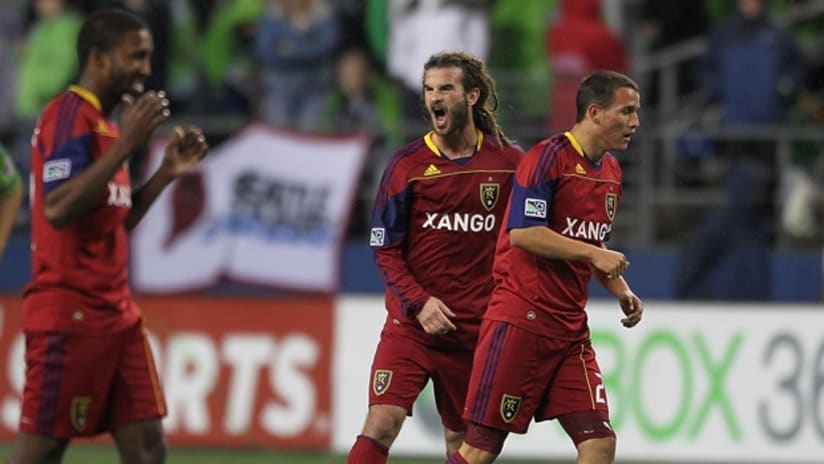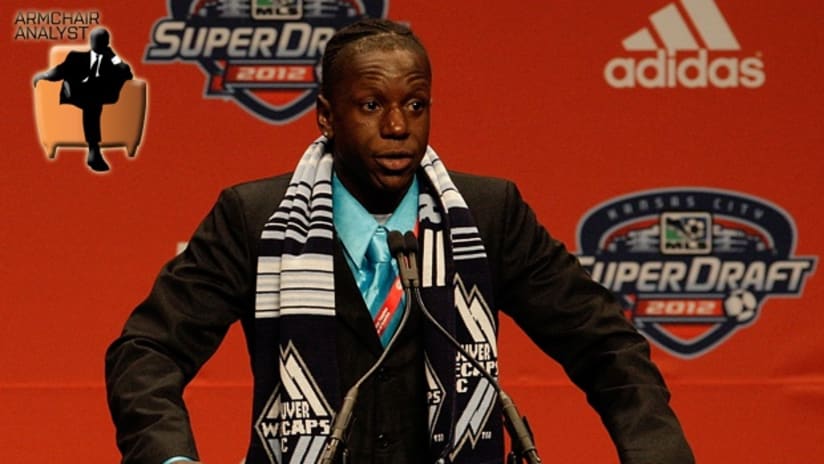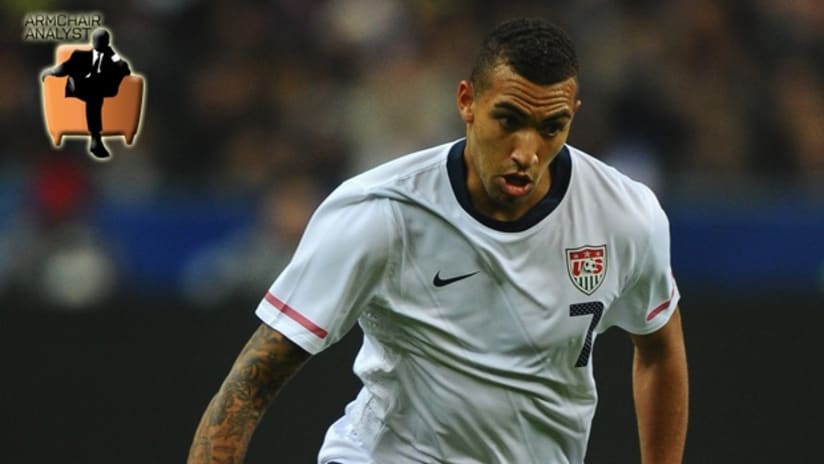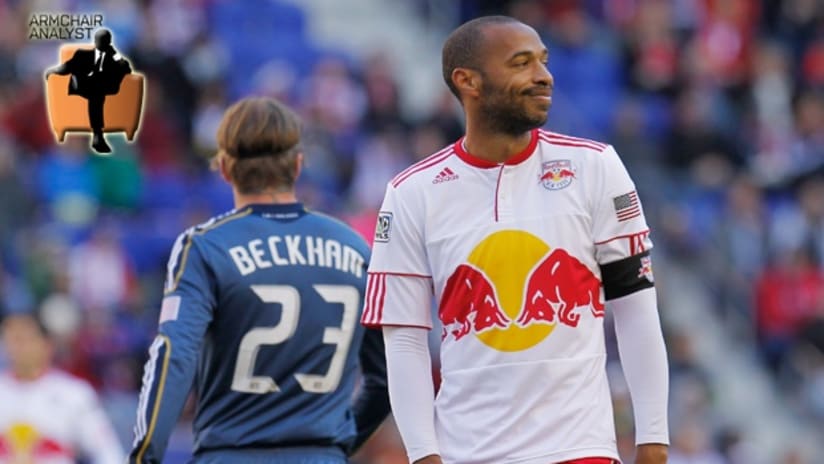The second leg of the Conference Semifinals provided a little bit of magic and a lot of drama, and a bit less bad blood than we maybe should have expected after what was really an ill-tempered weekend.
The Nos. 1 and 2 seeds advanced in the East, while out West Supporters’ Shield winners LA Galaxy cruised past the Red Bulls, maintaining bracket integrity. The only blip was the elimination of the No. 2-seeded Sounders, but that came after an epic 180-minute battle with Real Salt Lake, quite possibly the best No. 3 seed in MLS history.
We’ll start there...
Seattle Sounders 2 (2), Real Salt Lake 0 (3)
After three halves of slamming their collective heads against the door that was RSL’s airtight midfield, the Sounders finally wised up and decided to skip the middle of the park all together. And in so doing, they nearly ended up stealing the series.
The big tactical shift was to have Jeff Parke be the main distributor, an easy choice given how deep RSL were dropping. He completed more passes into RSL’s half of the field in the first half hour of the second half than he did in the rest of the series combined.
Meanwhile, the movement of the Seattle attackers changed noticeably. Right midfielder Roger Levesque cut inside when the Sounders were in possession, acting almost as a center forward, while striker Fredy Montero pulled wide to the left. That forced RSL’s ad hoc backline into off-the-ball choices.
As Jason Kreis said, those choices weren’t perfect. Chris Wingert and Chris Schuler scrambled well in the central defense and won most of their one-on-one battles, but Seattle’s unpredictable movements crossed them up a bit at times and gave right back Zach Scott, in particular, room to ping in cross after cross after cross.
But when you have a 3-0 lead to start the night, scrambling well is usually enough. And on Wednesday night, it was.
Sporting KC 2 (4), Colorado Rapids 0 (0)
Sporting played a very deep line almost from the start of Wednesday’s midwestern monsoon, basically daring the Colorado attack to string passes together and refusing to allow any run-outs on ‘keeper Jimmy Nielsen.
It wasn’t a cynical ploy, just a pragmatic one that any manager worth his salt would have made. The Rapids were never able to figure out how to piece attacks together against a deep backline once Conor Casey went down, and Peter Vermes was smart enough to see that for what it was.
On the other side of the ball, it was just more of the same for Sporting: Get the ball wide quickly, and if the line stays deep, drive at them and try to draw fouls. They are, as they showed on the night, deadly on set-pieces.
If Colorado had played a higher line, then the plan would have been to cycle the ball quickly back to the central midfield and try to play Teal Bunbury through on goal. Which is the exact plan that Vermes used in the first leg of the series.
Houston Dynamo 1 (3), Philadelphia Union 0 (1)
Peter Nowak swore up and down on Thursday night that his team was the better one over the two legs, but that flies squarely in the face of what was on display over 180 minutes.
Houston are not a complicated or complex team (which, by the way, is what makes them very good - it’s a simple game, after all). They want to win set-pieces and give Brad Davis a chance to cross the ball. In the first leg, Davis had 10 crosses; in the second, he had nine. So there’s zero surprise that the Dynamo won fairly easily.
The interesting tactical aspect, though, was the way the forwards lined up before and after they had a two-goal lead. In the first half, Calen Carr pushed much higher than Brian Ching, keeping big central defenders Danny Califf and Carlos Valdes occupied and meaning Ching had the chance to win headers against less physical players like Brian Carroll and Michael Farfan. He, of course, won those headers repeatedly and allowed the ball to be played quickly to the flanks, giving Davis those crossing opportunities.
In the second half it was Ching who pushed higher, while Carr dropped into more of a midfield role. The goal was primarily defensive, designed as it was to have Carr disrupt Philly’s ability to build from the deep midfield (it worked). On the offensive side, Ching was there to play quick passes into space for overlaps. That part of it never really came off, but it didn’t have to since the Dynamo were already up two goals in the series.
LA Galaxy 2 (3), New York Red Bulls 1 (1)
The first 15 minutes of this one were maybe the worst the Galaxy have looked since their 4-1 drubbing by RSL way back in April. No Juninho meant no pressure on Thierry Henry, who played as a trequarista instead of a forward, and that space Henry had led directly to Luke Rodgers’ early goal.
LA tightened up by having Chris Birchall - Juninho’s replacement on the night - drop distinctly deeper and ballhawk on breakouts, while David Beckham did enough midfield running for three normal men. The combination led to an unusual number of turnovers from Henry once the game really got rolling.
Of course, RBNY still troubled the Galaxy at times, and Rodgers should have had the equalizer midway through the second half after Omar Gonzalez uncharacteristically got caught on the wrong side of the play for the second time on the evening.
But LA, as they’ve done all season, found a way to get yet another one-goal victory. First it was Mike Magee on a set-piece - and why Hans Backe had Dane Richards man-to-man marking while Joel Lindpere was on the post, no one will ever truly understand - then it was the silliest penalty anyone could possibly have imagined.
It wasn’t pretty, but it was effective. Which in many ways, has been the story of the Galaxy’s season.
Matthew Doyle writes the Armchair Analyst column for MLSsoccer.com




